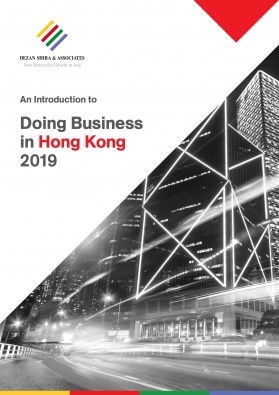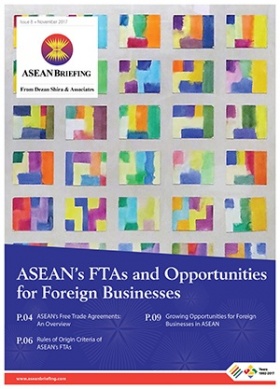The ASEAN-Hong Kong China Free Trade Agreement
The ASEAN-Hong Kong, China Free Trade Agreement (AHKFTA) came into effect on June 11 for Vietnam, Laos, Myanmar, Singapore, and Thailand. The remaining ASEAN member states will complete the ratification process later this year. The deal was first signed and agreed in November 2017 to increase economic cooperation, reduce taxes, and increase investment between regional markets and Hong Kong.
Analysts have noted that with ongoing trade tensions, Hong Kong businesses are keen to expand investment in Southeast Asia, and many expect these numbers to improve following the AHKFTA.
In addition to an increase in traded goods, the FTA and the Investment Agreement (IA) will encourage the service sector in ASEAN countries to take advantage of Hong Kong’s professional, financial, commercial, and legal services. The region will also benefit from increased investment flows, especially in the real estate, manufacturing, and service industry.
With increased access to Hong Kong’s trade network, its proximity to mainland China, and China’s Belt and Road Initiative, foreign and domestic firms should prepare to take full advantage of the FTA.
ASEAN-Hong Kong trade explained
Hong Kong is among the world’s most open economies, and with its liberal tariff regime, the FTA aims to increase the flow of goods and services from Hong Kong to the ASEAN countries.
The agreement covers four major areas, namely tariff reduction for goods traded, reducing restrictions for trade in services, longer stay for business travellers, and better investment protection. With respect to trade reduction, most ASEAN states will eliminate or reduce custom duties on goods from Hong Kong.
On reducing trade restrictions, both parties have agreed to remove restrictions on foreign capital participation and the number of people employed. Thailand, Vietnam, and the Philippines will also allow Hong Kong firms to take 50 percent or full ownership of firms.
On the issue of business travel, Hong Kong business visitors will be able to stay in an ASEAN country for 90 days. As of now, seven of the ASEAN member states allow Hong Kong travellers to stay for 14 to 30 days without a visa.
Hong Kong will be providing tariff free access to all products from ASEAN countries as the FTA enters into force, while for goods originating from Hong Kong, individual member states have made the following commitments on tariff reduction:
- Singapore will reduce customs duties to zero;
- Brunei, Malaysia, Philippines, and Thailand will eliminate customs duties of about 85 percent of their tariff lines within 10 years and reduce customs duties of about another 10 percent of their tariff lines within 14 years;
- Indonesia and Vietnam will eliminate customs duties of about 75 percent of their tariff lines within 10 years and reduce another 10 percent of their tariff lines within 14 years; and
- Cambodia, Laos, and Myanmar will eliminate customs duties of about 65 percent of their tariff lines within 15 years and reduce another 20 percent of their tariff lines within 20 years.
Hong Kong – ASEAN bilateral relations
As of 2018, ASEAN is Hong Kong’s second-largest trading partner in merchandise trade and the fourth largest in services trade.
Hong Kong’s total exports to ASEAN increased by 7.3 percent year on year to US$2.8 billion, while imports totalled US$73 billion, a 20.1 percent year-on-year increase. With China being ASEAN’s largest trading partner since 2009, trade is likely to further grow with Hong Kong increasingly handling re-export trade.
In 2018, the US $28.1 billion – or 97 percent – of Hong Kong’s exports to ASEAN were re-export items, of which 69.8 percent from mainland China highlighting Hong Kong’s importance as a trading hub.
Amongst the ASEAN member states, in 2018, Thailand, Singapore and Vietnam were Hong Kong’s top three trading partners at US$13.4 billion, US$12.3 billion, and US$10.7 billion of Hong Kong’s total exports with ASEAN, respectively.
Opportunities for businesses
With its liberal tariff regime, its position as a financial hub, a strong legal system, and excellent infrastructure, Hong Kong is an ideal location for Southeast Asian corporations.
Hong Kong has a Closer Economic Partnership Arrangement (CEPA) with China, which allows preferential market access to Hong Kong service providers and tariff-free treatment for products originating in Hong Kong. With the CEPA, ASEAN-China FTA, and AHKFTA, Hong Kong has the potential to facilitate and increase investments and trade across the region.Hong Kong also gives access to the Pearl River Delta Metropolitan Region (PRD), an economic hub in China, and with the signing of the Framework Agreement on Deepening Guangdong-Hong Kong-Macao Cooperation in the Development of the Bay Area in July 2017, regional cooperation will continue to increase. The focus is on increasing infrastructure connectivity, enhancing market integration, developing innovation hubs, building modern industries, and increasing international cooperation.
Hong Kong will continue to be a stepping-stone for mainland Chinese firms expanding in the region and a major destination of Chinese outward investments, attracting almost 60 percent of the total Chinese outward FDI.
A version of this article was originally published on June 21, 2019 by Vietnam Briefing and was republished by ASEAN Briefing on September 3, 2019.
About Us
ASEAN Briefing is produced by Dezan Shira & Associates. The firm assists foreign investors throughout Asia and maintains offices throughout ASEAN, including in Singapore, Hanoi, Ho Chi Minh City and Jakarta. Please contact us at asia@dezshira.com or visit our website at www.dezshira.com.








